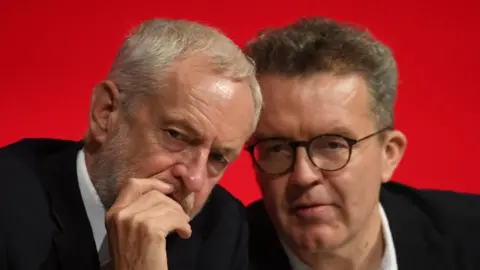General election 2019: Labour's deputy leader Tom Watson stands down
Labour's deputy leader Tom Watson is stepping down from his role and will not run as an MP in the December election.
He says he will continue to campaign for the party, and the decision was "personal, not political".
Labour leader Jeremy Corbyn thanked Mr Watson for his service, adding: "This is not the end of our work together."
Mr Watson has often been at odds with the leadership and faced an attempt to oust him at Labour's conference.
As an ardent Remainer, Mr Watson was also at odds with his own constituency, which voted 66% in favour of Leave at the 2016 referendum.
In his letter to Mr Corbyn, the former MP for West Bromwich East thanked the leader "for the decency and courtesy you have shown me over the last four years, even in difficult times".
He added: "Our many shared interests are less well known than our political differences, but I will continue to devote myself to the things we often talk about" - including gambling regulation, stopping press intrusion and campaigns on public health.
Allow X content?

He also said that after the election, he "won't be leaving politics altogether" - with plans to work on public health campaigns and release a book about his own struggle with type 2 diabetes.
He told the BBC that after 35 years in front-line politics, he wanted to "take a leap and do something new", but he said he would be out campaigning for the Labour Party to make sure a Labour government is elected.
"In politics you have got to know when to step away and for me this is a personal decision. There's lots I have got going on in the future. I just think I need a complete change after a long period of frontline politics and I am rather looking forward to it," he said.


Tom Watson and Jeremy Corbyn seem keen to part on good terms but their supporters were often at loggerheads.
Mr Watson was at the head of a group of around 100 moderate or centrist Labour MPs which called itself the Future Britain group.
Labour's deputy set the group up in March and it was widely assumed it was a means of keeping critics of Jeremy Corbyn inside the party following the inauguration of the ill-fated Independent Group of MPs.
It was more than a mutual support group - it also intended to develop social democratic policies rather than simply cede the agenda to the left.
But it has lost its well-known figurehead tonight and the question now is whether some of its members will follow Tom Watson out of Westminster, convinced that dragging Labour back to the pre-Corbyn era is a lost cause.
That answer may come in the election of Mr Watson's successor - or successors as Jeremy Corbyn apparently favours two gender-balanced deputies.
A Blairite or Brownite candidate is unlikely to succeed.
But whether an MP on the soft left - beyond Mr Corbyn's circle - succeeds him, could determine whether the party remains a broad church.

In his reply, Mr Corbyn said: "Few people have given as much to the Labour movement as you have and I know that many thousands of members and trade unionists you have inspired and worked with over the years will be very sorry to see you go."
Allow X content?

Mr Watson was elected deputy leader in 2015 on the same day that Mr Corbyn won his own ballot to run the party.
But the pair come from different political wings of Labour.
Mr Watson was a close ally of former Prime Minister Gordon Brown and worked in the top team of previous party leader Ed Miliband.
But Mr Corbyn was on the backbenches during this period and further left on the political spectrum than his deputy.
Brexit battles
Since the pair have been running Labour, there have been a number of public disagreements, including most recently over the party's Brexit position.
While Mr Corbyn has refused to say how he would campaign in a further referendum - as promised by the leader if Labour wins the election - Mr Watson has called for the party to "unequivocally back Remain".
The day before the party's conference in September, there was also an attempt to kick Mr Watson out of his post by the chief of the left wing campaign group Momentum, Jon Lansman.
However, the motion Mr Lansman tabled at a meeting of the National Executive Committee was dropped after Mr Corbyn intervened.
In recent months, Mr Watson has also faced criticism for meeting Carl Beech, the paedophile fantasist who falsely accused VIPs of sexually abusing him.
He was accused of giving "oxygen" to Beech's claims, but Mr Watson said he met Beech to offer him reassurance on behalf of the police.
Daniel Janner, the son of the late MP Lord Janner who was falsely accused by Beech, said Mr Watson's position had become "untenable" and he "has stood down because he would have been defeated".
 PA Media
PA MediaA number of former Labour MPs have paid tribute to Mr Watson.
London Mayor Sadiq Khan said his "energy, passion for politics and commitment to campaigning - whether fighting against Tory austerity or for better regulation of the gambling industry - will be much missed".
Jess Phillips, who also represented a seat in the West Midlands before Parliament dissolved for the election, told the BBC: "It's so very, very sad. I feel genuinely sad.
"I think the Labour Party needs to fight the election hard and then do some serious work to make sure we are the best we can be."
The Jewish Labour Movement also called the decision "shocking and saddening", saying he had been a "strong ally in the fight against anti-Semitism in the Labour Party".
